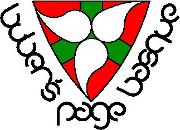By the early 1990s, the Internet became generally available to the public, and in 1994 the first Basque website, http://www.buber.net, was created in the diaspora by Blas Uberuaga who grew up in the Basque community of Boise, Idaho. In the homeland, for instance, the Basque Autonomous Community government established its first website in October 1996.

In 1997 the Basque club or euskal elkartea from Seattle, Washington, U.S., became the first Basque diaspora club ever to construct an online presence. Seattle was soon followed by other clubs such as the Utah Basque Club from Salt Lake City, and the North American Basque Organizations (NABO) in 1998. In 1999, the Basque Museum and Cultural Center of Boise also established its own website. It became the first online representative of the Basque community of Boise.
Nearly 90% of the institutional websites (i.e., official sites of diaspora institutions) that comprise the Basque digital diaspora had been established in the new millennium. As of March 2009, the diaspora had formed 211 associations throughout twenty-four countries, of which 135 (or nearly 64%) had a presence in cyberspace in twenty countries (or over 83% of the total).
Basque community associations in Boise also became active and joined the Basque Museum and Cultural Center in cyberspace, while multiplying their online presence by combining different online platforms including blogs, websites, and social network sites such as Facebook and Twitter. This trend demonstrates a powerful potential for Basque diaspora expression online.
The Basque diaspora is utilizing the Web as a twenty-four-hour easy to use and inexpensive platform to communicate, interact, maintain identity, create and recreate social ties and networks to both their homelands and co-diaspora communities regardless of geographical distance and time zones due to the low cost, effectiveness, and speed of the Internet. Basque diaspora web sites, blogs and social network sites are platforms for communication, social interaction, and representation.
The majority of the Basque diaspora webmasters in the U.S. and throughout the world argue that the Internet has the potential to maintain Basque identity abroad in terms of information, interaction, and communication, while reconnecting individuals with their collective identity and with a larger global Basque community—homeland and diaspora.
In your opinion, what impact do the Internet and social network sites such as Facebook have on strengthening and maintaining Basque identity in the diaspora?

